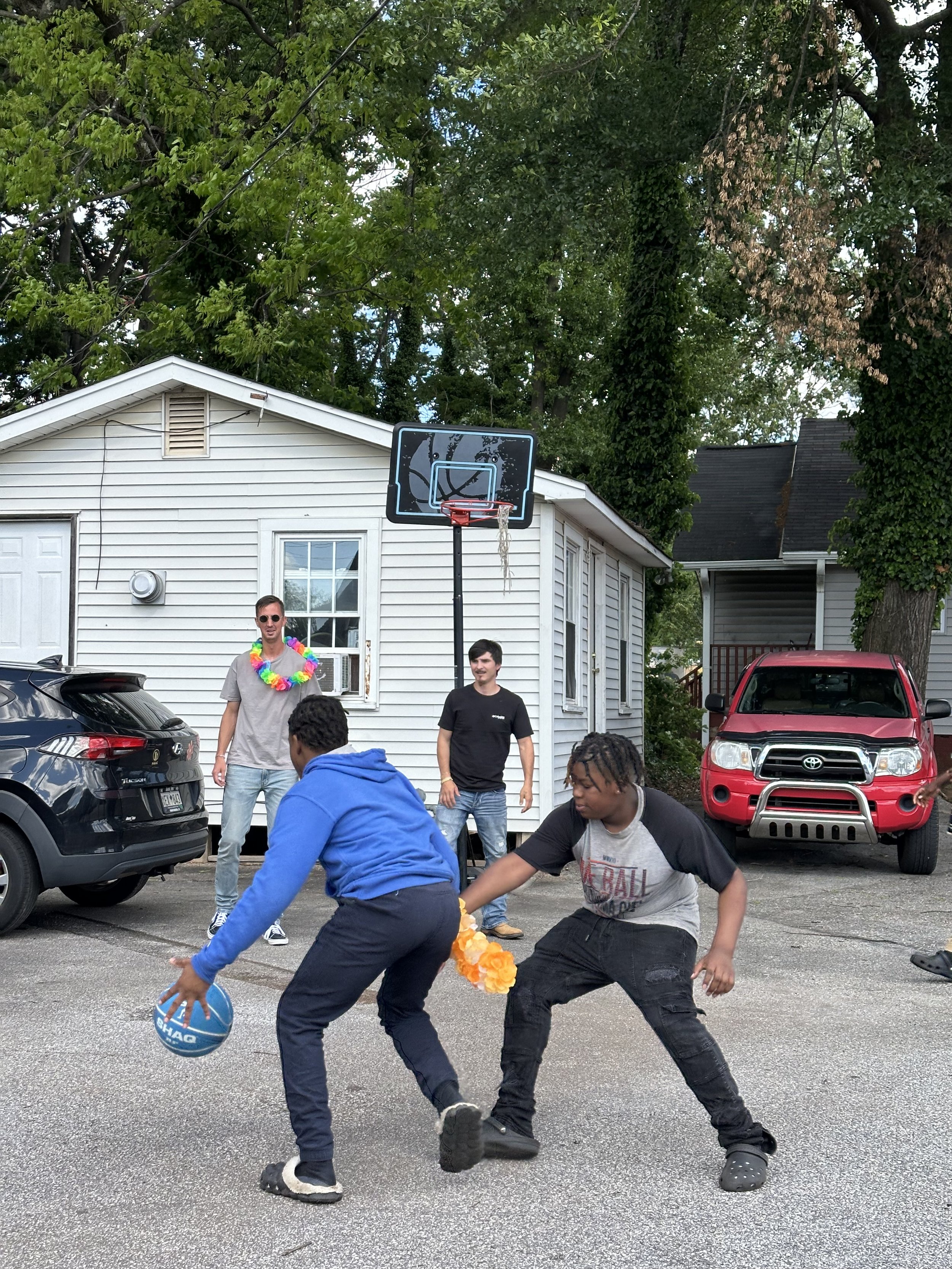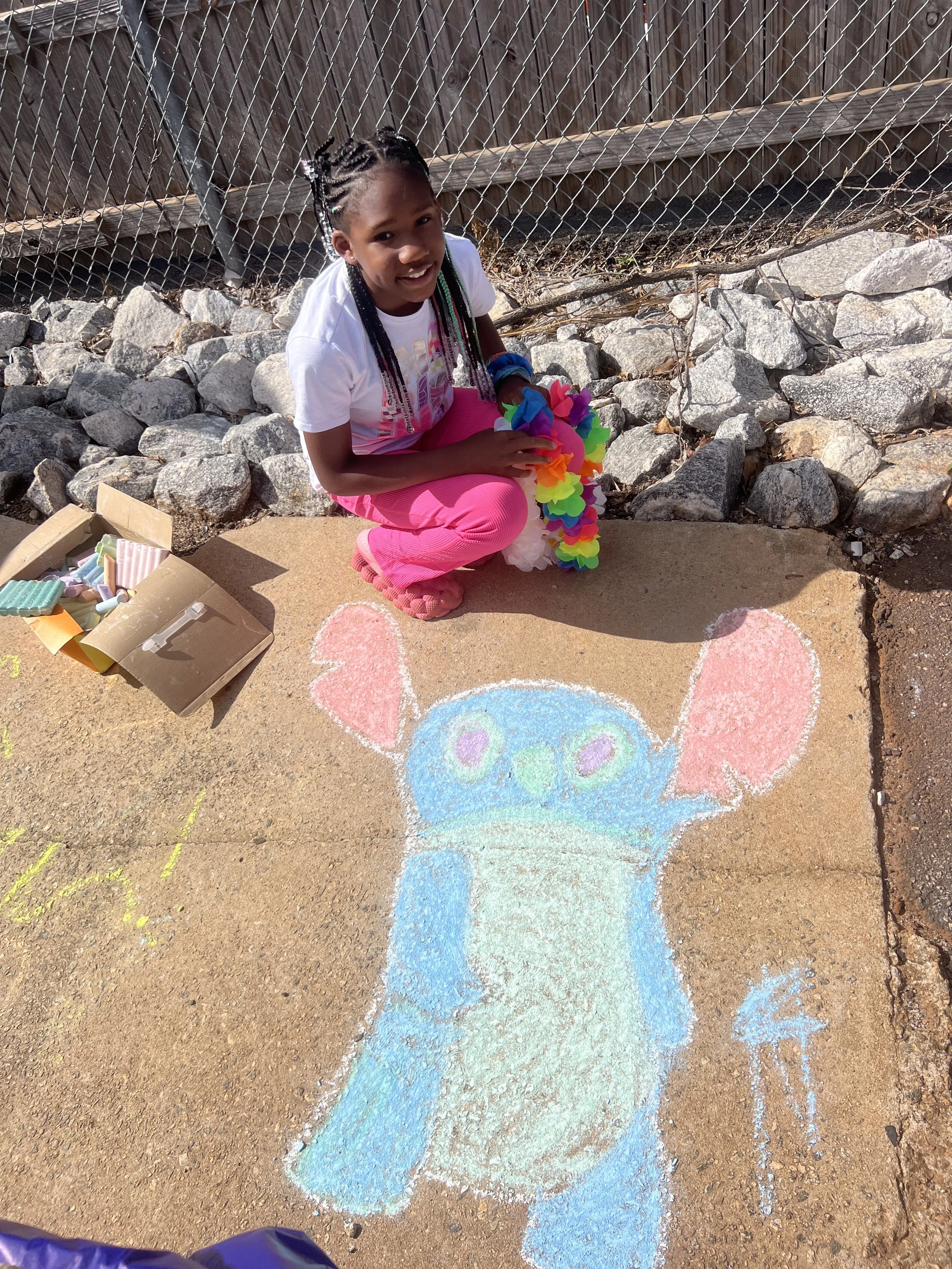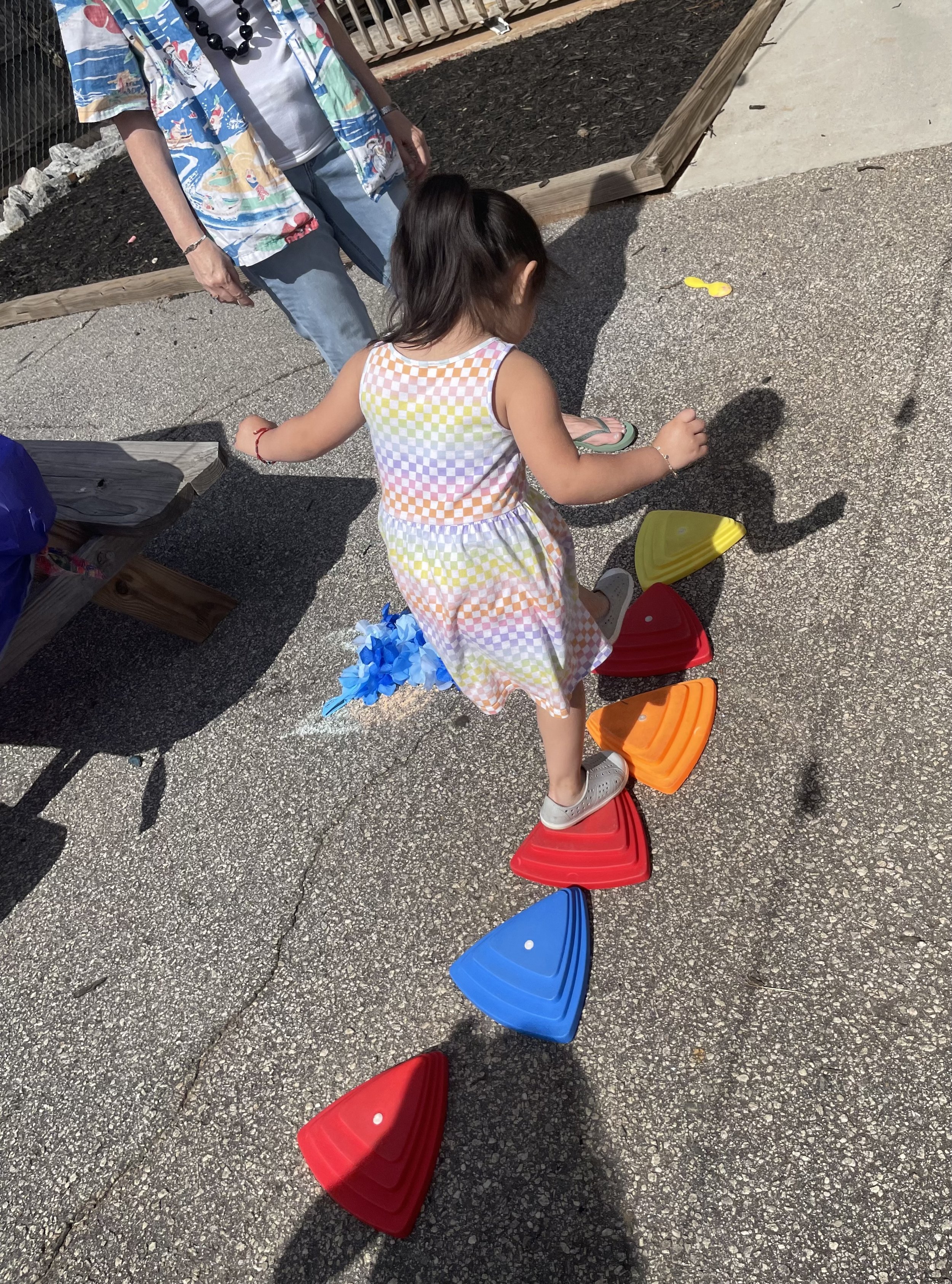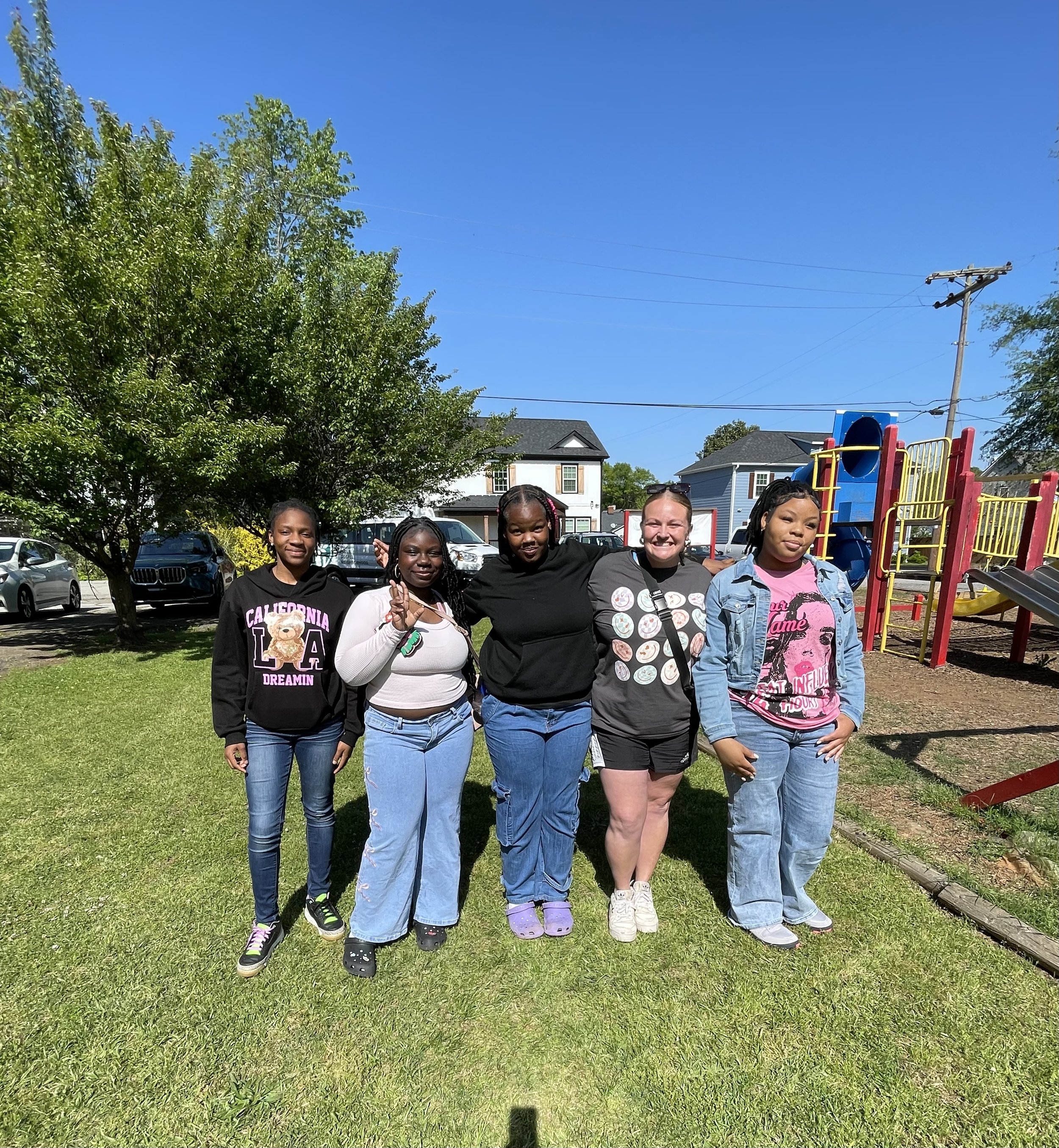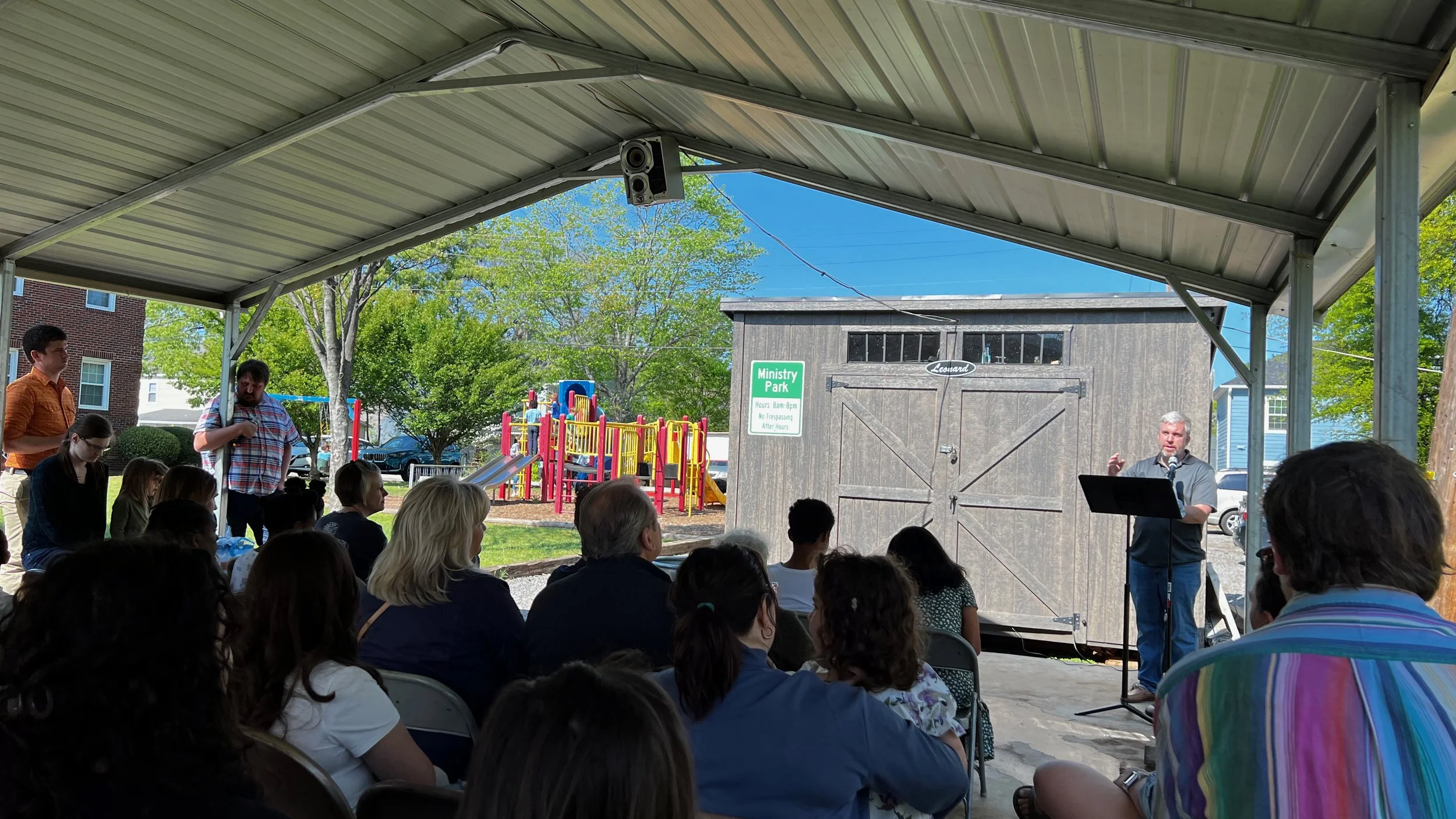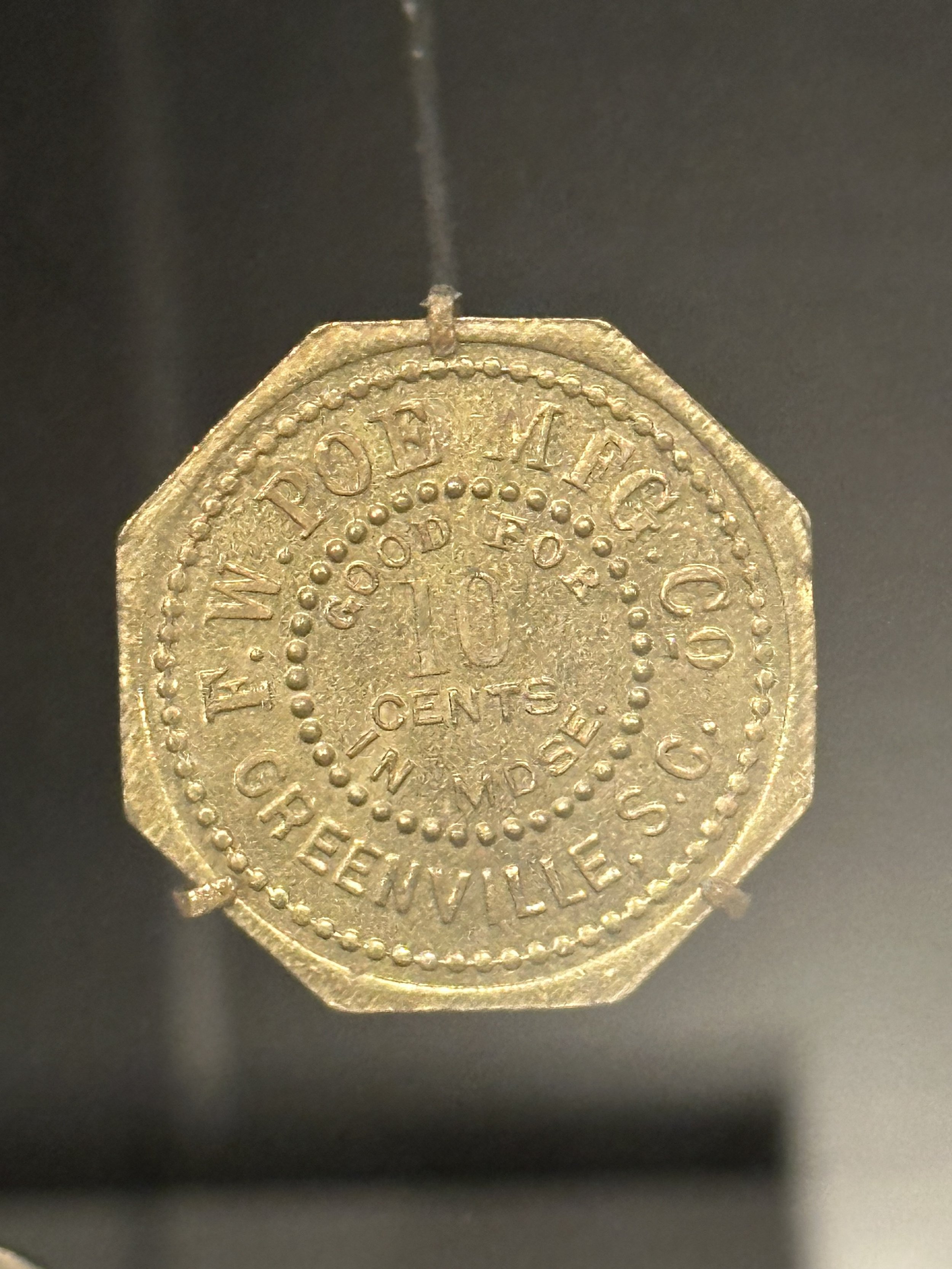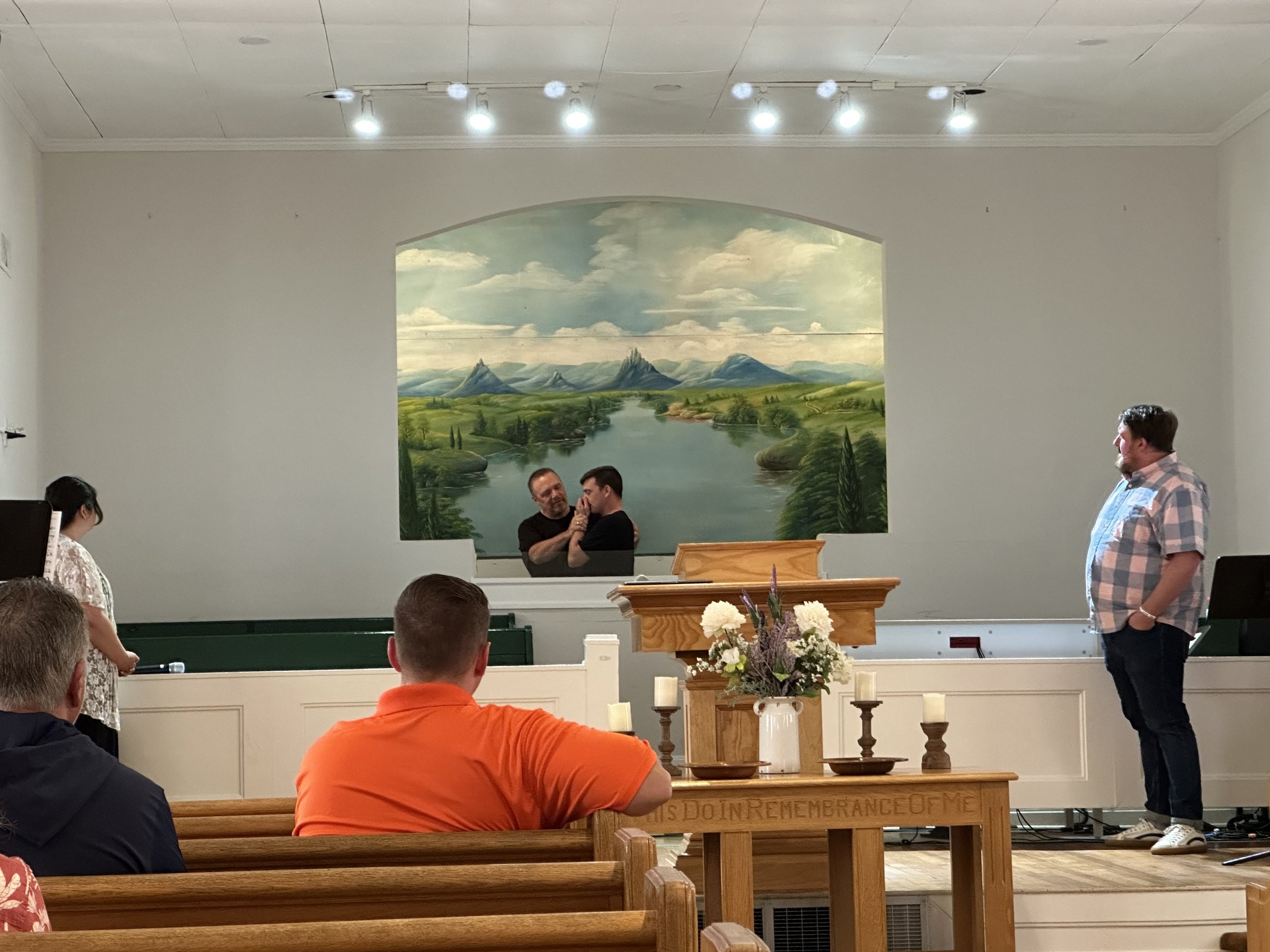A look Back at Neighborhood Network
On Sunday, we celebrated our last Neighborhood Network of the school year with a Hawaiian luau-themed party. There was Kahoot, games, art, and pizza involved. We want to thank everyone who worked so hard to volunteer and make this whole season of Sunday nights happen! Now onto our summer activities!
A Look Back at The Palm Sunday Party
Check out these photos from our Palm Sunday Party in Poe Mill! We ate, praised, baptized, and had an Easter egg hunt.
Easter 2025
Sunday, April 13th, we will gather at Ministry Park (27 2nd Ave.) at 4 p.m. for a Palm Sunday Party! Because Jesus is King!
We will start right at 4 p.m. sharp with singing, teaching, and celebrating baptisms. Our parties are generally drop-in, but since this has a worship service attached to it, we will be starting right at 4:00, so feel free to come early to get parking and a seat. This helps support our members who are serving and getting baptized. Then, after worship, we will serve food, play on inflatables, and have an easter egg hunt for our church and some friends from the neighborhood. Think of it as part worship service, part block party.
On Friday, April 18th, at 7 pm, we will have our Good Friday Communion Service. This is a simple service with singing, scripture reading, a time of prayer, and sharing the Lord’s supper. There is child care available for kids 3 years old and younger.
On Easter morning, our worship service is as normally scheduled with kids' ministry downstairs. We will have a big, celebratory worship service praising Jesus for rising from death!
When you come on Easter morning, be sure to pick up a flower from the welcome table. They will be used in an element of the adult worship service (kids will get their own flowers when they check in downstairs).
At the end of the service, our new Spring issue of Saltbox Quarterly will be available for pick up! And, there will be a photo booth outside between the sanctuary and the store front. We hope this helps you remember this special day of celebration and praise with your friends and family.
On Easter morning, everything we take in from the offering plate will be given to our dear friends and partners at Sammy’s Mission (sammysmission.org). David Carson, who runs Sammy’s Mission, was once homeless in the Poe Mill area, battling addiction. Through a series of providential circumstances, he checked into the Miracle Hill Overcomers Program and got sober. He and his wife, Mandi, now run 5 Christian-based transition homes for men seeking recovery here in Greenville. We want to do all we can to help.
The Commitments of Church Membership
Here are the commitments members make to the church and that church leadership make to the members.
MEMBERSHIP COMMITMENT
While a member at Griggs…
1. I AM COMMITTED TO GRIGGS STATEMENT OF FAITH.
I affirm my belief in the fundamental tenets of Christianity as outlined in our statement of faith. As a member, I am committed to upholding, living out, and sharing this faith.
Furthermore, anything that is not in the statement of faith I hold with an open hand so as not to cause division around any secondary doctrine or personal preference.
2. I AM COMMITTED TO ATTENDING AND PARTICIPATING.
I am committed to reasonably regular attendance at worship services. I will actively participate in the life of the church through groups, serving, or both.
3. I AM COMMITTED TO GIVE AS THE SPIRIT LEADS.
I will contribute financially to support the ministry and mission of the church as the Lord leads.
4. I AM COMMITTED TO PEACEFUL CONFLICT RESOLUTION.
As much as lies within me, I will live peaceably with all men. Should I offend others, I am willing to be approached and corrected and will do what I can to be reconciled with those I offended. If others offend me, I will seek resolution with them in a spirit of love, following the guidelines in Matthew 18:15–17 under the supervision of the elders.
5. I AM COMMITTED TO UNITY AROUND THE MISSION OF THE CHURCH.
I am committed to being unified with the church in mission and vision. As much as I am able, I will serve the neighborhood of Poe Mill, share my faith, and make disciples.
6. I AM COMMITTED TO GRIGGS LEADERSHIP.
I am committed to following the leadership of the elders and deacons. I will participate in congregational voting when major decisions arise, and so long as I stay at Griggs, I will accept the decisions that are made in those meetings.
7. I AM COMMITTED TO ACCOUNTABILITY.
I am committed to pursuing my brothers and sisters in Christ should they engage in unrepentant sin, and I am committed to being pursued if I should engage in the same.
8. I AM COMMITTED TO LEAVING GRIGGS IN A LOVING, TRANSPARENT SPIRIT.
I understand that my membership at Griggs is a commitment, not a covenant, vow, or contract. Thus, I can discontinue my membership at any time I wish for any reason. However, if I decide to join a new church, I aim to leave with peace and transparency (informing others of my departure) rather than just disappearing, yet doing so without an unnecessarily critical spirit.
LEADERSHIP COMMITMENT
While leaders at Griggs…
1. WE ARE COMMITTED TO PROTECTING GRIGGS' STATEMENT OF FAITH.
We are committed to exemplifying this faith. We will not allow false teachers into our leadership. Should any false teaching creep in, we will not leave it uncorrected. Furthermore, we will not allow open-handed or secondary issues to rise to the level of rrcore doctrine.
2. WE ARE COMMITTED TO FACILITATING REGULAR WORSHIP AND SERVING OPPORTUNITIES.
We are committed to facilitating worship services that magnify Jesus and spur on gospel transformation. We will lead opportunities for members to engage in Christian community and Christian service.
3. WE ARE COMMITTED TO UPHOLDING BEST PRACTICES IN HANDLING CHURCH FINANCES.
We will handle finances in a transparent, accountable, and mission-driven way.
4. WE ARE COMMITTED TO PEACEFUL CONFLICT RESOLUTION.
As much as lies within the leadership, we will be peacemakers. Should members find themselves in disputes, we will commit to leading them through a biblical reconciliation process with a spirit of love, following the guidelines outlined in Matthew 18:15–17.
5. WE ARE COMMITTED TO LEADING THE MISSION OF THE CHURCH IN UNITY.
We are committed to leading the church to unity around our mission and vision. We will provide opportunities to serve, share your faith, and make disciples in Poe Mill.
6. WE ARE COMMITTED TO PLURALITY.
We are committed to following the leadership of our fellow leaders and submitting to one another. We will always seek to make decisions unanimously and never lead in different directions. We are committed to being unified ourselves on matters we bring before the congregation in business meetings.
7. WE ARE COMMITTED TO ACCOUNTABILITY.
We are committed to accountability for our leadership and we are committed to providing accountability for the members of our church.
8. WE ARE COMMITTED TO FOLLOW UP WITH THOSE LEAVING GRIGGS.
We understand that your membership at Griggs is a commitment, not a covenant, vow, or contract. Thus, you can discontinue your membership at any time for any reason. However, we will aim to help you leave with peace and resolution. We will encourage (or help) you to find a new gospel-preaching church family as quickly as possible.
A list of Spiritual Disciplines
A simple list of spiritual disciplines we’re going over during session 1 of this years Griggs retreat.
BIble reading & Prayer
Reading the Bible, meditating on how it applies, praying about that very thing back to God, and then waiting to see if anything from the holy spirit comes to mind. (Something to repent of, something to do, something to write down.)
Bible memorization
Take a verse that you need right now, on this day, and it becomes your mantra. Write it on a 3x5 card, or make it the background of your phone, and you say it over and over again like you’re a little kid in AWANA.
Bible study
This is where we seek to learn something specific about theology from the Bible. For example, seeking to know what the Bible says about friendship and digging into all the passages you can find on friendship.
Gratitude
Extended time in prayer or journaling thanking God for specific things.
Intercessory Prayer
This is where we make it a practice to pray specifically for someone else. And this includes praying for your enemies
Fasting
This is where you forego something, most of the time food, so that you can use that important time for prayer.
Confession
Extended time of confessing our sins, our failures, our mistakes, our frailty, our weaknesses, or temptations.
Set reminders using the daily prayer app. https://www.rethinkme.com/dailyprayer
Sabbath
This is the oldest one in the book…literally. It’s a day where you set aside an extended period of time to not work, but to talk with God, to worship God, to enjoy God’s gifts…and rest in God
Hospitality
Hospitality Is the spiritual discipline of creating space for others to be seen and heard - particularly those who are strangers to a new place - or those who are suffering, sick, or sinful.
Simplicity
This is the spiritual discipline of seeking to live with less, be content with less, live with less distraction. It’s not talked about as much as the other spiritual disciplines, but it is ALL throughout the scriptures
1 Timothy 6:6-8 – “Godliness with contentment is great gain... If we have food and clothing, we will be content with these.”
Luke 12:15 – “Be on your guard against all kinds of greed; life does not consist in an abundance of possessions.”
1 Thessalonians 4:11 that you also aspire to lead a quiet life, to mind your own business, and to work with your own hands, as we commanded you.
2 Thessalonians 3:12 Now those who are such we command and exhort through our Lord Jesus Christ that they work in quietness and eat their own bread.
Community
Counsel, conversation, accountability, and fellowship with other Christians.
Envisioning the Vision
Take a moment to slow down, quiet your heart, and imagine the vision of Griggs Again…
Take a moment to slow down, quiet your heart, and imagine the vision of Griggs again…
• You walk into Griggs and see a very diverse group of people worshipping, conversing, and serving together with the familiarity of a family dinner.
• The poor, the rich, and everyone in between are mixing in a happy, hospitable environment so spirit-led a group prayer could break out at any moment.
• You go downstairs and check your child into a super fun but serious kids ministry that teaches theology as if it’s a little church within the church.
• You go upstairs to enjoy a beautifully simple service that is all about Jesus. You hear teachings about Jesus’ rich way of life for us individually and corporately and are reminded so frequently of the good news that your anxieties and frustrations dissolve under a grace that enables you to rejoice in all things, even suffering.
• You are always welcomed to Griggs Groups, that you might live in community. You have others back, and they have yours. You work together to redeem past tragedy and fight future temptations.
• You are given service pathways that help you grow in your spiritual gifting. You give knowing that everything is going to make one of the darkest areas in our city light up with good news and good deeds.
• You hear updates from the stage about other simple churches that we collaborate with and how they are making their West Side neighborhood noticeably better. We know what’s up with them because we are one. We share a network of pastors, resources, and energy throughout the Mill Crescent.
Now, ask Jesus to help us continually realize this vision and ask him to continually reveal to you your part in it.
Community Resource Guide
This is an attempt to compile information on scores of resources available in Greenville. There’s information on organizations that can help with all sorts of things - free food, housing, mental health, veterans issues, and more.
Our friend Kirsten Windbiel from Grace Church shared this with us recently and we wanted to make it available for everyone. Clicking the image below will take you to the Community Resource Guide! (If you run into any access issues please request access or email media@griggschurch.com with your issue).
This is an attempt to compile information on scores of resources available in Greenville. There’s information on organizations that can help with all sorts of things - free food, housing, mental health, veterans issues, and more.
One hope for this document is to give you a handy way to answer questions. If you meet a homeless woman at Griggs asking about housing, you can use this guide to get her started. If a man comes to a small group and is interested in addiction recovery, there are a few options listed in the guide.
It’s just a helpful, centralized place to find addresses, phone numbers, and websites. We hope it helps us all as we love the people of West Greenville.
The Bible
Studying the Bible without considering all that Jesus accomplished would lead to empty religion. As Jesus Himself said, "You search the Scriptures because you think that in them you have eternal life; and it is they that bear witness about me" (John 5:39).
The Bible is God's Word, completely true and without error. Its ultimate purpose is to reveal God's plan to redeem mankind from Satan, sin, and death. The heart of this plan is found in the Gospels—Matthew, Mark, Luke, and John—where we encounter the good news of Jesus. In a profound way, the entire Bible is about Jesus.
This doesn't mean the Bible only teaches us how to convert to Christianity. All Scripture is God-breathed and useful for doctrine, reproof correction, and instruction in righteousness. However, it does mean that the Old Testament points forward to Jesus' coming and is fulfilled in Him. The New Testament, from Acts to Jude, guides Christian living by pointing back to Jesus. And Revelation looks ahead to His second coming.
Therefore, studying the Bible without considering all that Jesus accomplished would lead to empty religion. As Jesus Himself said, "You search the Scriptures because you think that in them you have eternal life; and it is they that bear witness about me" (John 5:39).
So, whenever we study the Scriptures, interpret the Scriptures, or seek to apply the Scriptures to our lives, we do so through the lens of all that Jesus did and taught.
The Gospel
Anyone who confesses their sin and wholly depends on Jesus will receive salvation. Salvation is a gift from God, given to sinful humanity by His love and grace alone.
The gospel is the good news that Jesus Christ, God's Son, is the promised King, the Messiah. Through His life, death, and resurrection, He mercifully and justly offers full access to the Kingdom of God to all who repent of their sinful state and believe in Him. This invitation extends to everyone, including those that society often sees as abandoned by God—the outcast, the poor, the sick, the unclean, and the guilty.
Anyone who confesses their sin and wholly depends on Jesus will receive salvation. Salvation is a gift from God, given to sinful humanity by His love and grace alone. Our Salvation includes, among other benefits, being forgiven of our sins, justified before Him, and brought into a right relationship with Him. When we receive salvation, we also receive the indwelling of the Holy Spirit, who transforms us into new creations in this life, serving as a guarantee of eternal life in God's presence.
Ultimately, after Jesus returns and executes His final judgment of the living and the dead, those who trusted Jesus in life will dwell in a new heaven and new earth, where sin and its curse will be no more.
Sammy’s Mission
Recently, on Recovery Sunday, we had David Carson from Sammy’s Mission share their ministry with us. David Carson used to be homeless, traveling between Poe Mill and City View on the West Side.
Recently, on Recovery Sunday, we had David Carson from Sammy’s Mission share their ministry with us. David Carson used to be homeless, traveling between Poe Mill and City View on the West Side. He lived in active addiction. He was eventually introduced to Miracle Hill and was able to get sober and start following Jesus.
His passion became helping other individuals do the same. He named his ministry after his best friend, Sammy Johnson, who died from his addiction. Sammy’s Mission exists so that men struggling with hopelessness and addiction experience hope, hear the Good News of God’s love, live in sobriety and serve others.
They now have multiple transition homes and have helped 83 men live in sobriety. By God’s grace, their graduate relapse rate is about 50% lower than the national average. That tells us that what they are doing is working. Praise Jesus.
Mitch and David Carson praying together at Griggs.
Poe Mill Coins
A little bit of Poe Mill history. The workers of the mill were paid, in part, with “tokens” to the mill owned convinient store. There were ups and downs to this form of compensation.
Did you know that folks who worked in Poe Mill received part of their compensation in a private money system? As part of their pay, workers would receive tokens for the Poe Mill general store.
There was some convenience to this! It was nice having a general store right in the heart of your neighborhood so that you could have consistent, direct access to essential goods.
There was also some conflict of interest in this. Being paid partially in “tokens” kept you from spending your money outside of the mill village and put your pay right back into the mill owner's pocket. Below is a photo of an old token the Mill workers would have received.
What is a Church?
“Ekklesia” is what Jesus had in mind when he said in Matthew 16:18 that he would build his “church.” He would call a group of people out of the world and to himself to continue his purposes in the world.
Our word “church” in our English Bibles often stands in for the Greek word “ekklesia,” which literally means “those who are called out.”
“Ekklesia” usually refers to a group of people coming out of the broader population and assembling together. Assembling for what? In the context of the New Testament, the answer is the worship and mission of Jesus.
“Ekklesia” is what Jesus had in mind when he said in Matthew 16:18 that he would build his “church.” He would call a group of people out of the world and to himself to continue his purposes in the world.
If we read further into the New Testament, we see Jesus and his apostles establishing this gathering in two senses. In one sense, the church is universal. All of us who worship Jesus are part of the church, no matter where we are or when we live.
For example, Ephesians 1:22–23 says, “And he [the Father] put all things under his [Jesus’] feet and gave him as head over all things to the church, which is his body.” The sense of the word “church” here is universal—it speaks of all believers. The other sense in which the word church is used has to do with locality.
The New Testament speaks of, and prescribes, Christians organizing, worshipping, fellowshipping, and evangelizing based on their geography. Paul, for example, writes to the church at Colossae (Colossians), Philippi (Philippians), and Ephesus (Ephesians). Jesus, in Revelation 2–3, speaks to seven local churches in different geographies.
So, were these local churches merely places like homes (Philemon 1:2) or auditoriums (Acts 19:9–10) similar to our modern-day church buildings? No. Though gathering does require a physical place, the marks of the New Testament church were more people- and practice-oriented than they were place-oriented.
WE BELIEVE IT’S HELPFUL TO THINK OF THE LOCAL CHURCH IN THE TERMS OF A FAMILY.
In fact, the Scriptures often refer to the local church by using the imagery of a family, particularly using the term “household.”
The church is a household in which God is our Father and we are brothers and sisters.
Galatians 6:10: “Therefore, as we have opportunity, let us do good to all, especially to those who are of the household of faith.”
1 Timothy 3:15: “If I am delayed, you will know how people ought to conduct themselves in God’s household, which is the church of the living God, the pillar and foundation of the truth.”
Ephesians 2:19: “So then you are no longer strangers and aliens, but you are fellow citizens with the saints and members of the household of God.”
What makes a household? It’s actually not the house. It’s what the people of the house share. The household may share an identity, like a last name or a bloodline, or perhaps they share agreed-upon responsibilities, rhythms, and purposes.
It’s the same with the local church. What unites us as brothers and sisters is not just where we gather but what we share.
According to the Scriptures, here are some of the things a local church must share to be a true family:
WHAT WE SHARE THAT MAKES US FAMILY
1. A shared statement of faith on essential doctrines (Galatians 1:6–9).
2. A shared, qualified leadership of elders (pastors/shepherds) and deacons (1 Timothy 3).
3. A shared administration of the Word and sacraments (Ephesians 5:19; 2 Timothy 4:2; 1 Corinthians 11:23–26) under the authority of those elders and the guidance of the Holy Spirit (Hebrews 13:17).
4. A shared practice of church discipline for anyone in the church teaching heresy or living in unrepentant sin (1 Corinthians 5:2).
5. A shared, trustworthy system of receiving and distributing funds to meet the needs in the church community and fuel the mission (Acts 6).
6. A shared mission (the Great Commission) to make disciples locally and abroad (Matthew 28:19–20).
7. A shared dedication to continually discipling each other in Jesus’ ways, using our spiritual gifts (1 Corinthians 12:4–7) in an effort to present every man, woman, and child mature in Christ on the last day (Colossians 1:28).
In essence, a church is not just a building or a place of worship; it is a family of local believers who are united by their shared faith in Jesus, their shared mission, and their agreement to live it out under a shared authority.
Church Fathers on Mark
Here are the quotes from early church leaders on the book of Mark which we shared recently on a Wednesday night.
Here are the quotes from early church leaders on the book of Mark which we shared recently on a Wednesday night.
A Look into Kid’s Ministry
The following is an excerpt from our kids ministry handbook. All volunteers will review this handbook soon, but we want to share this part with all of our parents and visitors so they can hear the heart behind our program.
The following is an excerpt from our kids ministry handbook. All volunteers will review this handbook soon, but we want to share this part with all of our parents and visitors so they can hear the heart behind our program.
Purpose
Here at Griggs our philosophy for kid’s ministry is ”A church within a church.” Simply put, we want Sunday morning for all ages to focus on sharing the Gospel, building community, and growing in our understanding of God. We don’t want the kid’s ministry to just be a “childcare service.” We want it to be a safe, fun environment where children can learn about the Gospel at age-appropriate levels while their parents focus on worship and instruction during the service upstairs.
We accomplish our purpose by focusing on three main categories: Safety, curriculum, and connection.
Safety
To ensure that parents feel comfortable with leaving their child, we have a check-in system to make sure every child is accounted for. The sticker they get has their name, any important medical notes the parents want added, and a parent contact number.
We also have all volunteers backgrounds checked. The volunteers talk with the Children’s Directors before serving to make sure they feel comfortable with their roles on Sunday mornings.
We have Service Leads every Sunday who lead a pre-meeting with our classroom volunteers. The Service Leads also run the check-in system and assist the classrooms if anything comes up (child needs to go to the restroom, needs water, someone gets hurt, etc.).
There is a simple first-aid kit in every classroom and a robust kit at the check-in station. Our directors are CPR, AED, and Epi-pen certified and can to step in if ever necessary.
Curriculum
We use The Gospel Project curriculum from Lifeway. It is broken down into 12 volumes (there are 13 lessons per volume) that begin at creation and work their way through the whole Bible.
This program is gospel centric and has a “Christ Connection” that goes along with every lesson to show the students how the OT and NT are all connected.
We practice one scripture passage and catechism for a whole month to help it really sink into the students memory.
All students do a review coloring page during class and then get companion activity pages that go along with that weeks lesson to complete at home with their parents.
Connection
We want to make sure we are connecting with the students and showing them genuine Christlike love, by encouraging them, teaching scripture, and getting to know each of them on a personal level. We want them to know we listen to them and are genuinely interested in their likes, dislikes, hobbies, and lives.
We want to make sure we are connecting with the parents. We need to check in with them and see how they are doing, encourage them, and discover what ways the church can help them. This may include getting them connected with other families in the same season or with people who have some wisdom because they’re on the other side of the toddler tantrum or pre-teen years.
We want to connect with the volunteers. We want to make sure volunteers feel confident about what they're teaching and how the classroom should run. We want to pray with them and make sure they know that Children's ministry can be difficult at times. We want to make sure volunteers feel comfortable sharing the wins and the hard parts of their classroom. We also want to take a genuine interest in our volunteers lives and know how we can support them.
Greenville Homeless Report
We’re thankful for our friends at the Greenville Homeless Alliance. Please see their report below to get a good understanding of housing issues on our side of town.
We’re thankful for our friends at the Greenville Homeless Alliance. Please see their report below to get a good understanding of housing issues on our side of town.
What is Affordable Housing?
Because we follow Jesus, we care about affordable housing and recognize it as a need. As a church, our contribution to the issue is to continually pray for and, when we can, support our fellow Christians who have dedicated their ministries to housing our neighbors Jesus’ way and in Jesus' name.
Pastor Mitch here.
As we minister in and around West Greenville, you will hear concerns about affordable housing. Therefore, it may be helpful for you to have a definition of affordable housing in the back of your mind.
The general definition of affordable housing is a safe, livable space (apartment, house, etc.) for a family unit that does not cost them more than one-third of their monthly income.
When people spend over one-third of their income on housing, they often cannot afford the other basic necessities of life. They also have a much higher chance of defaulting on their loans.
The more specific definition of affordable housing, in most contexts, refers to governmental laws or programs that aim to help families with low incomes acquire and stay in homes for one-third of their monthly income, even if that amount is lower than the city’s fair market value. Stratham Place, right across from Mountain Goat, is one example in our neighborhood. These apartments are funded by the government, and the wonderful folks living there pay different rents based on their income, which must be below the poverty line to qualify.
In Greenville, the average income is $60,000, meaning the average home buyer can afford a $250,000 home. Yet, the average home in Greenville costs over $300,000. This means people with average incomes will struggle significantly to find a home, and those with low incomes are almost completely locked out of home buying.
The situation is similar with renting. Middle-class and low-income families must constantly choose between having fewer bedrooms than needed or spending over one-third of their income on rent.
As a result, they either have to move away from Greenville or endure a very low quality of life. This can create economic, safety, and crime issues that lower the overall well-being of the city.
The government is compelled, at least in theory, to try and create ways for low-income families to stay, work their jobs, and make progress. There are cases in which this works out and cases in which it does not. For example, I have seen civic leaders claim they are addressing affordable housing, while in reality, they are just developing homes that are slightly less luxurious and expensive than they could be. Thus, they get social credit for caring about the poor while benefiting from partnerships with high-end developers.
Many times, the best solutions come from Christians in our community who care about this issue, like our good friends at Homes of Hope, Front Porch Housing, and Soteria Community Development Corp. These are all non-profits that we fully support. They also aid families in finding and maintaining affordable housing, not by rule of law or tax incentives but through the giving and volunteering of the church and the community at large.
When ministries tackle affordable housing, they often care for people in a more holistic way. For example, they may require (and provide) treatment for addiction as part of their housing program.
This often results in boosting people's financial health AND spiritual health which is a huge, God-honoring win for Greenville.
Because we follow Jesus, we care about affordable housing and recognize it as a need. As a church, our contribution to the issue is to continually pray for and, when we can, support our fellow Christians who have dedicated their ministries to housing our neighbors Jesus’ way and in Jesus' name. They are true heroes who are doing what has to be one of the most challenging ministry tasks there is.
A look Back at 2024
We know that so many of our people serve in quiet, hidden, unofficial ways. And though that service is harder to list, it makes Griggs Church what it is. For the lists we can and cannot make - All Glory be to Christ.
Here's some of the moments we celebrated this year by God's grace and for Jesus' fame on the West Side.
In 2024 we…
Hosted college students for a discussion on neighborhood ministry
Helped raise money for and send out Jaaz & Kaitlyn Cofer to Mongolia
Canvased for the Poe Mill tree planting project & planted the trees requested
Held a leader and volunteer retreat for over 30 of our people
Threw 2 Spring block parties and provided serving opportunities for the students at MRCA
Hosted a neighborhood carwash and provided serving opportunities for the students at BJA
Baptized 4 people
Dedicated 2 babies
Added 6 members
Hosted 3 serve days for students of Fellowship Greenville, setting up work projects for them in Poe Mill
Provided significant benevolence for at least 6 neighborhood residents
Established the position of elder and installed 2 new elders
Supported two of our members as they went on short-term mission trips
Held 8 church-wide Wednesday night dinners in the summertime, especially blessing the homeless community
Rented out a waterpark for a Poe Mill water night and over 50 neighborhood residents came
Ran 3 weeks of kids’ summer camp providing mission trip opportunities for students of Grace Church
Ran Fall Family Fun Night for the neighborhood alongside Park Place Church of God
Created a community newspaper, Saltbox Quarterly, and distributed over 350 copies.
Took two van loads of our neighborhood kids & youth to CiCi's Pizza….twice
Held a fall men’s event and a fall women’s event
Took approximately 30 Poe Mill kids to Walmart to get Christmas presents for their families
Ran the Poe Mill Christmas Parade alongside Park Place Church of God
Served dozens of neighborhood families after Hurricane Helene
Studied 17 books of the bible line by line through groups and sermon series
And these are just some of the tangible moments we can point to.
This list doesn’t point out the hundreds of unseen things Jesus did through daily, simple means. It would be truly amazing to see a list of encouraging words we shared with one another, or helpful insights we gave each other during Griggs Groups, or the new friendships that have formed. We know that so many of our people serve in quiet, hidden, unofficial ways. And though that service is harder to list, it makes Griggs Church what it is.
For the lists we can and cannot make - All Glory be to Christ.
A look Back at the Christmas Parade
Thank you to all who served and celebrated with us during The Poe Mill Christmas Parade. Special thanks to Park Place Church of God for hosting the event. We love our neighborhood!
Giving Thanks Like a Skater
One of the most grateful places I’ve ever seen is the DIY skatepark at Poe Mill. Some of the most grateful people I’ve encountered are the skaters who use it, skating every day like it might be their last—because, any day now, it could be.
Photo Credit: Isaac Cropsey
Get this article and others just like by signing up for our quarterly newspaper!!
As we approach this time of year, it feels like our city—from the East Side to the West—naturally leans into what God has called us to embrace all year long: Gratitude. Scripture tells us, “In everything give thanks; for this is the will of God in Christ Jesus for you” (1 Thessalonians 5:18).
Gratitude is “the will of God.” That means it’s what’s best for us.
This ancient wisdom is affirmed by modern science. For the past two decades, psychologists like Robert A. Emmons, along with researchers at Stanford and other universities, have studied the effects of gratitude on the body. Their findings show that people who regularly practice gratitude have lower blood pressure, healthier heart rates, better sleep, and reduced stress.
If gratitude is what’s best, then why aren’t we more grateful all year round? Because we forget.
We forget how blessed we are. We forget how short life is. So we naturally resort to focusing on accumulation. We make getting more and more for ourselves the goal, which makes us grumpy, not grateful.
But during the holiday season, we know that we’re getting a few special days that only come around once a year and that will soon be gone. The short time we have for the holidays highlight what is truly important and enable us to live more gratefully and thus live more fully.
I’ve seen this idea in action for the last couple of years in what some would assume is a very unlikely place.
One of the most grateful places I’ve ever seen is the DIY skatepark at Poe Mill. Some of the most grateful people I’ve encountered are the skaters who use it, skating every day like it might be their last—because, any day now, it could be.
The skatepark was built by volunteers out of the rubble of the fire that burnt down the mill in the early 2,000s. For years, skaters have enjoyed the park, but in 2020, developers bought the land and announced plans to build luxury apartments over it. Now, four years later, it appears that construction is set to begin.
These skaters know that the skatepark was a gift that rose from the ashes. They also know their time there is short and getting shorter. The result of these circumstances? Gratitude. They skate with an incredible, admirable thankfulness, enjoying every last trick.
This gratitude was on display recently at Woodbine Studio, where dozens of portraits of the skaters, taken by photographer Zach Scuggs, hung on the walls as a tribute to the good times they’ve had. It was also evident during their last official skate contest this summer on “Go Skate Day.”
When our life is about accumulating more and more, we usually end up sitting and sulking alone. Gratitude, on the other hand, leads us to joyfully engage and build up our community.
This is another hallmark of the skatepark. Through Shelter Skate Church, a ministry led by Josue Rodriguez, which you can follow on Instagram (@shelterskatechurch), the good news, and good cheer, has powerfully overflowed into the skatepark and out to the neighborhood every Monday night for years.
The lesson of the Poe Mill skatepark is when we humbly acknowledge that everything we have, and every day we have with it, is a gift of grace - we can truly appreciate everything we receive to the fullest.
On the other hand, entitlement, a constant longing for more, a life of accumulation leads to angst and disappointment because, on this side of heaven, nothing lasts forever.
Let’s pray for these skaters as they’re facing this change. Let’s learn from these skaters as we face our own changes, leaning on the Spirit to give us a consistent sense of blessedness.
Happy Thanksgiving and Merry Christmas! This season, let’s not just lean into gratitude—let's embrace it as a daily practice that shapes our hearts and minds. It’s what’s best for us.
Once A Victim, Forever A Voice
On December 10th, 2019, everything changed for Ms. Toni. That day is forever etched into her memory. “They came and interrupted my whole life. My life hasn’t been the same since.”
Get this article and others just like by signing up for our quarterly newspaper!!
Ms. Toni has called Poe Mill home for 12 years. Her first impression of the neighborhood was that it was “kind of quiet and pretty friendly.” A place where neighbors greeted each other warmly and went about their day. She knew the area needed work, but the community spirit gave her hope.
It’s true that Poe Mill is a neighborly place, overall. But because of some of the addiction issues we face on the West Side, we do see some crime on occasion. “Crime comes into the neighborhood and then leaves right back out,” Toni said, reflecting on how what she’s learned about the area’s struggles since moving in over a decade ago.
On December 10th, 2019, everything changed for Ms. Toni. That day is forever etched into her memory. The night before, Toni was visiting with her daughter who lived on 3rd Ave. in Poe Mill. Toni lives on 4th, a little over a block away. When Toni got into her car to drive home that night, she realized that the engine had died. So she just walked home instead.
The next morning was misty and rainy, the kind of day that makes you want to stay in bed. But bills needed to be paid, and errands needed to be run, so Toni knew she needed to get up, walk back to her daughter’s house and jump-start the car.
As Toni reached her daughter’s house, she noticed a Jeep passing by holding several young men. She now knows that one of them had a parent living in Poe Mill and that’s why they were in the neighborhood, but at the time all she knew was that she didn’t recognize the vehicle or its passengers. Something seemed off. However, there didn't seem to be a concrete reason to rush inside her daughter's home.
But moments later, as she lifted the hood of her car, two of those young men had gotten out of the jeep, jumped over a nearby fence, and approached her from two different directions.
“They came and interrupted my whole life. My life hasn’t been the same since.”
“They shot me in the stomach four times,” she said, recounting the attack that left her seriously injured. It appears the young men were after her purse, which they had seen her carrying as she walked down the street.
Despite the shock and pain, Ms. Toni was somehow able to remain focused. Having a concealed weapons permit, Miss Toni was prepared to defend herself. After one of her assailants tried to wrestle her from behind and more shots were fired at her, she pulled out her gun and fired back in self-defense, causing her attackers to flee. Miracle of miracles, she remained standing the entire time. “I never hit the ground,” she recalls. The first of many miracles that surround the incident.
“I was able to walk up the steps into my daughter’s house and across the living room,” she recalled. Once seated on the couch she instructed her daughter’s roommate to grab a towel. The roommate froze in panic, but a neighbor, a teenage boy named Immanuel, rushed over from across the street, into the house to help, getting towels and stopping the bleeding. Ms. Toni doesn’t think Immanual was there by accident. Rather, for Toni, he was another miracle, there to act as a testament to his name which means, “God with us.”
The scene was chaotic. Everyone was trying to process what had happened. Yet, strangely, Ms. Toni remained aware, sitting up, and able to talk.
Neighbors who heard the shots had called 911. When the emergency vehicles showed up, she walked herself to the ambulance, and stayed alert for the entire ride. When she saw that they had made it to the hospital she finally let herself rest, spending the next few days in her hospital bed. “I don’t remember much from those days, except waking up and seeing my daughter and my son,” she said.
Her son reminded her that “she has always been a fighter,” and she was doing a good job fighting now, while she laid in the hospital. Then, a final miracle came to light, the bullets had not hit any vital organs and she was released to go home after only being hospitalized for one week.
Through it all, Ms. Toni felt the presence of God guiding her. “At the end of the day, it was all God,” she reflected. “He intervened, he strengthened me, and he had me prepared.”
The ordeal ended up being much more than just a moment of survival for Ms. Toni—it was a revelation. It brought her closer to God, strengthening her faith and commitment to His plan. “I got closer to Him after that happened. He’s always been a part of my life. I used to go to church with my grandmother, and now I’m on the right path, doing what He wants me to do,” she said.
Ms. Toni now views her life through the lens of divine purpose. “God revealed that I have a purpose: to do His will, to do what He asks of me,” she said. Her experiences with gun violence have transformed her into an advocate, speaking out against the dangers that plague communities like Poe Mill. She is involved in several non-profits and is starting her own which she plans to call “Applying Love.” Her story reminds us all that the tragedies we face don’t keep us from our purpose, they often clarify it.
She spends most of her time these days serving and speaking, especially sharing her story, which has given her a platform to testify of God’s power and protection. She has come by and shared her testimony with us at Griggs during a Sunday morning service.
“We may look like nobodies to some people because of where we live, but I’m here, and I’m an activist,”
Ms. Toni said, firmly making her case for Poe Mill’s hopeful future.
When I asked her what she believed Poe Mill needed she said, “We need more police presence. The kind of police presence where they’re interacting with the kids and showing kindness to the homeless.” she said, calling for authorities to be engaged in the area proactively.
She believes the neighborhood needs a community center, a place for people to gather, support one another, and have some fun - something she says Poe Mill is good at.
We agree. Our hope at Griggs is to continue to be that community center, especially while the neighborhood is without a more traditional one.
Though she believes in and advocates for certain changes and reforms, Ms. Toni knows that the change Poe Mill needs starts from within. “We need to learn to take care of things at home. Once we take care of things at our own home, then we can take care of others,” she said.
Her vision for Poe Mill is one of community togetherness and gospel-centered love. The kind of love Jesus taught us to share.
With that kind of love coming down from above, planted, and growing in our hearts, she believes that the neighborhood can rebuild and become just as vibrant and prosperous as any other, despite the hardships its residents face.
“God is still here. He has never left us,” she says confidently, rejecting the notion that any hardships we face are because God is finished with us. She still has the hope she moved into the neighborhood with.
“If he had left us, we wouldn’t be here,” she adds. I’ve heard many people say that, or something like it before. But there’s nothing quite as powerful as hearing Ms. Toni say it.
Thank you for reading! Check out more by subscribing to our quartlerly newspaper here.






